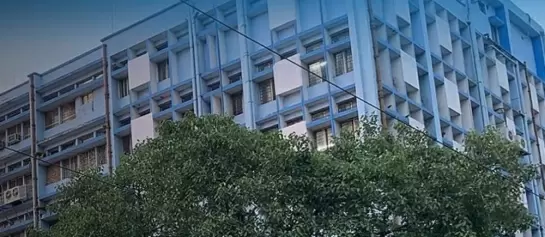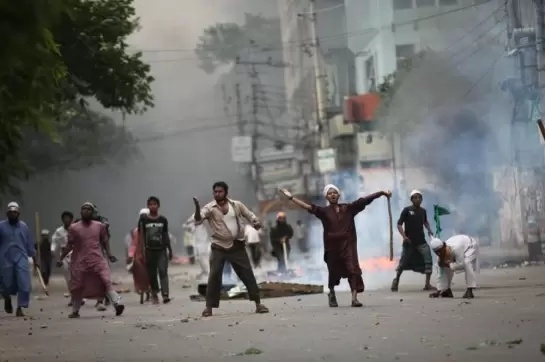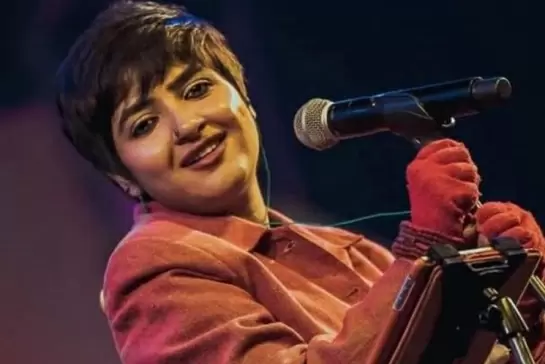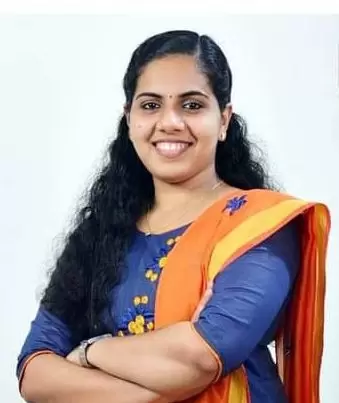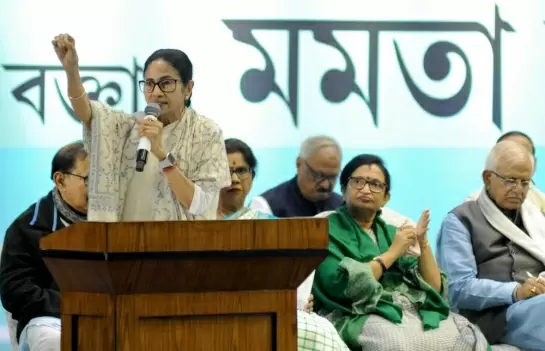Things to do if Modi becomes PM
12-May-2014
It is unlikely that Narendra Modi will be elected as the PM of such a diverse and vast country like India. In his election campaign, Modi’s PR machinery’s objective seemed to be to reach out to the electorate with the ideology of Hindutva and deepen and widen the politics of Hindu nationalism.
It did succeed to an extent in this objective. However, Modi’s electoral campaign did not remain limited to the core agenda of Hindutva.
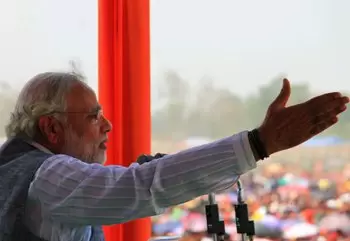 |
|
If BJP wins 272 plus seats, we will get an authoritarian government with little respect for democratic institutions (Photo: Indian Photo Agency)
|
The other strategy was to unite Hindus even while confusing and dividing the minorities by making them wear skull caps and burkhas in their rallies, meeting their religious leaders and trying to confuse the community that a section was supporting the BJP, particularly the Shia sect.
Finally the campaign also tried to hard sell the image of Modi as a strongman, who would talk tough with Pakistan, and would bring lot of development and jobs to the economy. Modi’s campaign made many contradictory and insincere claims before different sections of the populace with the sole intention of garnering votes.
Modi’s camp has also begun to display the nervousness betraying its lack of confidence in winning in 300 plus constituencies. It is now willing to break bread with Mamata and Mayawati after attacking them bitterly during the campaign.
Having expressed our sincere doubts about victory of Modi at the husting, in the unlikely event that Modi is able to form the government, what would be the scenario and what would be the options available to the liberal democratic forces? The answer to the aforesaid question depends on the strength of BJP in the Govt.
If BJP on its own is able to get 272 plus seats we will have aggressive leadership and an authoritarian government with little respect for democratic institutions. Neo-liberalism and market ideology will be the dominant discourse and the corporate sector that was the major contributor to Modi’s Rs. 50 billion campaign would want to get its pound of flesh.
Sexual minorities, dalits (not the political elite Ram Vilas Pawans and Ramdas Athawales and Udit Rajs but the landless rural and urban unorganized labouring dalits), adivasis, women, workers and religious minorities would be further marginalized and face increased violence.
Hindu Nationalist discourse would try to obfuscate this process of marginalization. As Mahatma Phule put it – hegemony of shethji-bhatji alliance would be strengthened.
Among the agendas that would be pushed are rethinking on article 370 of the Constitution giving special status to J&K, (this would require 2/3rd majority in Parliament), rethinking on the nuclear doctrine of “no first use”, Uniform Civil Code and Anti-cow slaughter legislations too may be on the cards.
The Sangh Parivar cadres would be less fearful of law and rogue elements among them would be more intolerant and intolerable. Many creative work of art and expressions would have to pass the test of whether it is critical of and/or threat to the hegemony of upper caste and patriarchy and if it is, the doctrine of it being offensive to the beliefs and culture of the majority community / nation could be invoked to suppress such expressions.
If BJP gets 200 plus seats and the NDA not more than 250, it would be relatively easy for the NDA to win over new partners but lack of absolute majority will make Modi’s leadership a little vulnerable to pulls and pressures and force him to engage with other stakeholders. However, he would be able to by and large push his important agenda – shethji-bhatji hegemony – albeit a little weakened.
In both the situations, the RSS backed agenda would be to keep key ministries of Human Resource Development (as through it, it could recognize Sangh Parivar run schools, re-write the textbooks and curriculum with Hindu nationalist perspective as they had done under Vajpayee and large budgets of government grants for research etc. would flow to organizations with Sangh Parivar affiliation or subscribing to Hindutva ideology).
School textbooks in Rajasthan (during BJP’s earlier term) and Gujarat praised Hitler to be a nationalist. In MP school curriculum include compulsory teaching of Geeta, Yoga, Saraswati Vandana.
The other ministry that Sangh Parivar normally bays for is Ministry of Defence and Home Affairs. That is to give prime postings for its point persons in security forces.
We have seen the use of security forces in Gujarat during Sohrabuddin, Kauser Bano, Ishrat Jehan and other encounter cases where Modi was lionized as heroic fighter of terrorism while his security forces were killing ordinary Muslims.
If BJP is able to win less than 170 seats and is the largest party, Modi’s leadership will be considerably weakened. Other regional parties would set their terms and conditions to form a coalition government which may force the BJP to elect another leader to run a more inclusive government on the basis of consensus.
Role of Civil Society
Even in the unlikely event of a NDA government being sworn in after 16th May 2014, the struggle for democracy, accountable state, defence of Constitutional liberties, communal harmony, pluralism and defence of secular values, social justice, economic justice, environmental justice, gender justice and equality will be continued by the civil society organizations. In fact the democratic struggles would, if anything, have to be intensified. While carrying on these struggles, our strength would be the Constitution of India and the legal framework.
Women, dalits, adivasis, workers, landless agricultural labourers, fisher folk, marginal and small peasants and religious minorities are likely to face further marginalization, dispossession and violence. There will be increased resistance to marginalisation of these sections. The state will be more repressive than hitherto as it will be prompted by the Hindu nationalist cadres and Hindutva ideology.
Therefore we will have to be prepared to struggle for justice for those resisting marginalization through engagement with criminal justice system. This will require strong and easily accessible network of legal aid clinics, para legal workers and awareness among the community about their democratic and constitutional rights.
Documentation of discrimination, marginalization and resistance is an important task that we will have to undertake. We also need to document hate propaganda and the processes of building prejudices against the marginalized sections of the society. We often lack proper and meticulous documentation which can be an important weapon in our fight against hatred. We need to train activists willing to document.
Civil society organizations working on right to information and making the government more and more transparent would have to organize more training for activists using the Act. We could have national, regional and zonal centres having experiences of using the Act and strategies to guide those who want to use the legislation.
Solidarity from international networks defending human rights and working for gender, environmental, social and economic justice would be crucial. Those linkages would have to be strengthened.
Judiciary with all its limitations of delays and the dominant class-caste, rich and powerful being able to influence the outcomes more in their favour, will be another institution to fall back upon as it still commands respect among the citizens of the country.
With all our limitations, the civil society organizations have always been working towards rectifying the prejudices against the religious minorities, dalits, women and adivasis. The prejudices against these sections are growing in spite of efforts of the civil society organizations.
Our efforts to rectify the prejudices will have to continue but we need to evolve strategies for better communication and wider outreach. For wider outreach, various forums will have to be used, including the social media, educational institutions, social gatherings and festivals, community forums etc. Short and crisp messages are communicated more easily than long ones. Our work in education and awareness will finally have to be sustainable through a chain of sustainable institutions.
Democratic struggles for justice, inclusion and empowerment of the marginalized are launched to address issues of different sections in isolation. For example, dalits mobilize for atrocities on them, while other marginalized sections are laid back, and likewise, Muslim organizations fight when Muslims are targeted, Christians for Christians and so on.
Expressions of solidarity are either non-existent or a weak voice. The solidarities will have to be strengthened and participation in each other’s struggles. The challenge is how do we convey that violence against or targeting one section/community is threat to the Constitutional guarantee of equality itself and will affect all marginalized sections with same intensity. We will have to learn to deepen democratic values of respecting diversity and ensuring social justice.
We will also have to reach out to the middle classes and win their hearts and minds and draw them into the struggles for defending democracy, liberalism and secularism. One way of achieving this is going to the schools and colleges and using the institutional fora like debating societies, literary societies, film clubs, extracurricular activities, lectures etc. to inculcate, convey and deepen the values of liberalism.
Though this may appear like a laundry list of tasks before us, collectively we will have to work towards a common goal of deepening democratic and liberal values irrespective of who wins in the elections.
Irfan Engineer is Director of Institute for Peace Studies and Conflict Resolution, Mumbai
CM Yogi Says No Deaths in Uttar Pradesh Linked to Codeine Cough Syrup
Udhayanidhi Stalin Accuses Centre Of Targeting Minority Votes, Urges Tamils To Verify Names In Voter List
Film Fraternity Grieves Sreenivasan’s Passing; Rajinikanth, Resul Pookutty, Prithviraj Pay Homage
US Launches Airstrikes On ISIS Targets In Syria In Retaliation For Deadly Attack
Over 1 Lakh Voters Deleted From Stalin's Kolathur Seat In TN Draft Electoral Roll





